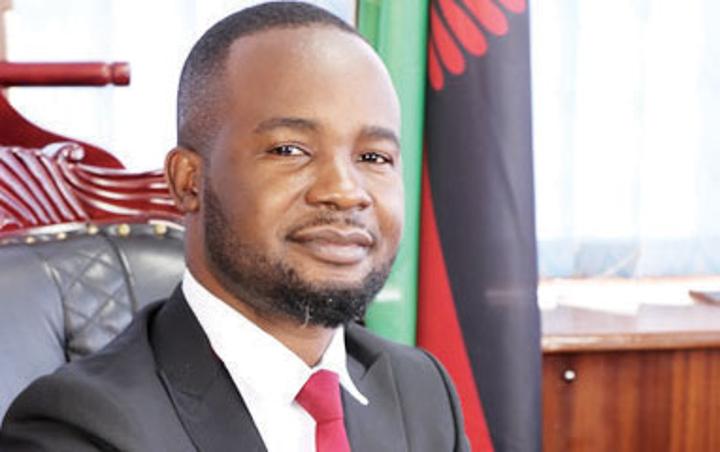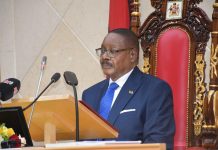Africa-Press – Malawi. Finance Minister Sosten Gwengwe Friday presented a K2.85 trillion revised 2022-23 budget. In his statement, Gwengwe announced a reduction of the budget deficit from K884 billion or 7.7 percent of GDP as presented in February to K842.1 billion, or 7.1 percent of GDP.
According to Gwengwe, the revised budget has seen Capital Hill shuffling resources to key priority areas, including the much-touted mega farms, while at the same time ensuring that essential areas such as health and education are protected. Gwengwe said the reduction in deficit is mainly because of projected foreign disbursements on grants and reduction in some expenditure lines.
“Domestic borrowing is expected to reduce from K653.9 billion to K580.9 billion which is a decrease of K72.9 billion. Overall, you will recall that we targeted to reduce the fiscal deficit from 8.8 percent of GDP in 2021-2022 to 7.7 percent in 2022-2023 fiscal budget.
“But now we have gone further and budgeted to achieve an even lower fiscal deficit of 7.1 percent of GDP. All of this is aimed at curbing inflation rate and achieving debt sustainability for macroeconomic stability,” Gwengwe said.
Presenting the performance of the budget in the first half of the fiscal year, Gwengwe said at mid-year, total revenue and grants for 2022-23 fiscal year amounted to K937.9 billion against a mid-year projection of K1.003 trillion.
Expenditure, on the other hand, overshot by K31.2 billion to hit K1.463 trillion mainly due to inflation and devaluation pressures. Recurrent expenditures were seen at K1.150 trillion while development expenditure at K313.0 billion.
Gwengwe said the over-expenditure in the first half emanated from compensations of employees, public debt interest, use of goods and services and grants. Looking forward to the end of the year, Gwengwe said total revenues and grants have been revised upwards from K1.956 trillion to K2.008 trillion.
“To the end of the fiscal year, domestic revenue is projected to go down from K1.636 trillion to K1.628 trillion. Of the total domestic revenue, taxes will account for K1.534 trillion while other revenues will amount to K94.4 billion. It will be noted that tax revenues have gone down by 0.1 percent from the approved position.
“Grants are projected to increase by K58.9 billion from K320.3 billion to K379.3 billion by the end of the financial year, representing 18.4 percent increase. This is on account of the net increase of current grants from International Organizations and Foreign Governments,” Gwengwe said.
On expenditure, Gwengwe said total expenditure has been revised upwards from K2.840 trillion to K2.850 trillion due to increases in compensation of employees, public debt interest and use of goods and services.
He said development expenditure has been reduced from an approved provision of K818.9 billion to K629.6 billion on the account of reduction on both foreign financed projects and domestically financed projects due to slow disbursements from donors and slow implementation.
“The provision for wages and salaries has been revised upwards by K8.8 billion from its approved amount of K670.3 billion to K679.2 billion. This is on account of a higher than planned salary adjustment of 12 percent.
“The provision for interest payments on debt has increased by K124.5 billion from the approved budget of K520.7 billion to K645.2 billion. The increase is on account of exchange rate adjustment due to the devaluation of the kwacha and higher interest rates,” Gwengwe said. He observed that the provision for goods and services has been revised upwards from the approved amount of K363.6 billion to K395.3 billion.
Gwengwe also revealed that beginning this season, government is working with Green Belt Authority, the Malawi Defence Force, the Malawi Prisons Service and private sector players including Press Agriculture to establish mega farms to increase agricultural production for both local and foreign markets.
The Finance Minister also announced lifting of the ban on holding conferences outside duty stations for civil servants and Government institutions to support the tourism sector recover.
“Government is also considering extending the Priority Industries Scheme to all local companies even those that were registered before 2013 to level the play field.
“As we look outside for investments, we should not forget local companies that must be encouraged to reinvest,” Gwengwe said.
Budget and Finance Committee of Parliament Chairperson, Gladys Ganda, has since hailed Gwengwe for taking significant steps to operationalise the mega farms. She also commended Gwengwe for removing the ban on lakeshore conferences for civil servants.
“As you might be aware, the tourism sector was hit hard when the austerity measures were put in place. As such, it affected the whole economy as well. So by removing the ban, we know that there will be some growth in the tourism industry.
“But looking forward, we encourage the Honourable Minister to also tell the nation as to what we have benefitted from the austerity measures because it is good to talk about the figures rather than just removing the measures,” Ganda said.
According to the revised national budget, Malawi’s GDP growth is projected at 1.7 percent in 2022, a downward revision from 4.1 percent envisaged at the start of the 2022/23 fiscal year. In 2023, growth is estimated at 2.6 percent.
For More News And Analysis About Malawi Follow Africa-Press






